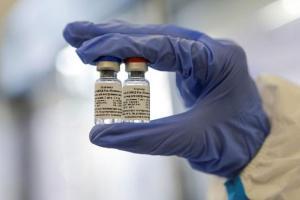Grand Challenges India was set up as a partnership of the Department of Biotechnology, Government of India, and the Bill & Melinda Gates Foundation in 2012, and Wellcome also joined the partnership

This picture has been used for representational purposes
A very large portion of COVID-19 vaccines are likely to be manufactured in India through the country's strong and robust private sector partners, said Bill and Melinda Gates Foundation CEO Mark Suzman. In an interview to PTI, Suzman noted that India is doing everything it can right now with the resources at hand to fight the COVID-19 pandemic. "I think India is doing everything it can right now with the resources at hand, but we are all hopeful that next year as some of these vaccines should come out...and our expectation is that a very large portion of these are likely to be manufactured in India through the strong and robust Indian private sector partners and then that will be the key area to focus on in the next phase of the COVID pandemic," he said.
ADVERTISEMENT
He underlined the need to have equitable global distribution of COVID-19 vaccines. "We believe passionately that there needs to be equitable global distribution, so everything we are doing is to make sure that the developing countries will be able to have access at the same time and at the same volumes as wealthy countries, because for a global pandemic that is essential, but then the exact pacing and distribution within the countries is going to depend on national guidelines with some of the global recommendations," he said.
He said the Bill and Melinda Gates foundation has been working at multiple levels to combat COVID-19. "We have been providing support, so called upstream, or research and development. We work with this organization, CEPI, the Coalition for Epidemic Preparedness Innovation, which has been a leading partner in investing in the potential vaccines. We have developed something called a therapeutic accelerator which has raised over USD 125 million to help find treatments that are going to be effective against COVID," he said. He said the foundation has been working to support a lot of work around diagnostics as well. "And in that context, we are strong supporters of this global effort, which India is part of, called COVAX, which is a multilateral initiative to procure vaccines at scale and then distribute them through the GAVI vaccine alliance to countries including India," Suzman added.
"And last but not least, we have also been directly supporting some specific investments, again some with Indian partners like Serum Institute of India and GAVI around particular vaccines which are very promising in order to make sure many of the products are being manufactured in real time and even ahead of regulatory approval for potential distribution because we want to make sure that the distribution goes to developing countries at the same time as rich countries, that you don't have the time lag with rich countries having bought up early available market, which have been the risk," he said.
He said the biggest learning from the pandemic is that at all levels, global, regional, national, there needs to be a permanent infrastructure in place that is prepared and ready to go which will keep the world much better prepared for the next one, which will come. "It is not as if the pandemic was really that much of a surprise, maybe the scale, the speed and the exact nature of the pathogen could not have been predicted but as Bill Gates and others have been warning for years, this has been one of the most likely global crises," he said.
"But we know that unknown pathogens have the potential to come in and wreak havoc so we should never again be caught flat footed. We need a global infrastructure, regional infrastructure and national infrastructure and right down to the community health level," he added. Responding to a question on how the Grand Challenges platform is relevant for the current pandemic situation, he said some of the networks and groups of scientists that joined the Grand Challenges are working hard on many aspects of COVID-19. "They also provided the platform that looks at related issues which is empowering scientific leadership in developing countries, particularly women, to think about what the long-term issues of the future are going to be or the present and the future, including but beyond COVID-19," he said.
Grand Challenges India was set up as a partnership of the Department of Biotechnology, Government of India, and the Bill & Melinda Gates Foundation in 2012, and Wellcome also joined the partnership.
Grand Challenges India works across a range of health and developmental priorities ranging from agriculture, nutrition, sanitation, maternal and child health to infectious diseases.
Keep scrolling to read more news
Catch up on all the latest Crime, National, International and Hatke news here. Also download the new mid-day Android and iOS apps to get latest updates.
Mid-Day is now on Telegram. Click here to join our channel (@middayinfomedialtd) and stay updated with the latest news
This story has been sourced from a third party syndicated feed, agencies. Mid-day accepts no responsibility or liability for its dependability, trustworthiness, reliability and data of the text. Mid-day management/mid-day.com reserves the sole right to alter, delete or remove (without notice) the content in its absolute discretion for any reason whatsoever
 Subscribe today by clicking the link and stay updated with the latest news!" Click here!
Subscribe today by clicking the link and stay updated with the latest news!" Click here!







